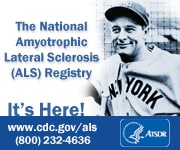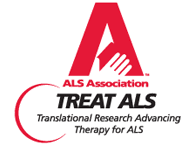The Department of Veterans Affairs (VA) Cooperative Studies Program was established to create a National Registry of Veterans with Amyotrophic Lateral Sclerosis (ALS). United States military veterans with ALS were identified through national VA electronic medical record databases and nationwide publicity efforts for an enrollment period of 4 1/2 years. Diagnoses were confirmed by medical record reviews. Registrants were asked to participate in a DNA bank. Follow-up telephone interviews are conducted every 6 months to track participants' health status. As of September 30, 2007, 2,400 veterans had consented to participate in the registry, 2,068 were included after medical record review, 995 were still living and actively participating, and 1,573 consented to participate in the DNA bank. 979 participants had been enrolled in the registry for at least 1 year, 497 for at least 2 years, and 205 for at least 3 years.
Fourteen studies were approved to use registry data for epidemiological, observational, and interventional protocols. This registry proved to be a successful model for identifying large numbers of patients with a relatively rare disease and enrolling them into multiple studies, including genetic protocols.
The VA concluded that if you served in the Southwest Asia Theater of Operations (Iraq, Kuwait, Saudi Arabia, the neutral zone between Iraq and Saudi Arabia, Bahrain, Qatar, the United Arab Emirates, Oman, the Gulf of Aden, the Gulf of Oman, the Persian Gulf, the Arabian Sea, the Red Sea, and the airspace above these locations) between August 2, 1990 and July 31, 1991 then ALS is presumed service connected. This means that those that apply for benefits are service connected automatically.
Just when the ALS data starts to really focus on the occurrences, would'nt you know it, the project runs out of funding and the enrollment was halted. The military areas of service where established and a set of new rules where ordained. This ALS VA Registry rule book was an opened and closed case.
What did the ALS VA Registry accomplish? Was it a genuine concern for the causes of ALS, basic benefits defined or to avoid possible future lawsuits? Was the VA aware of a similar study conducted by British researchers that reported ALS also occured in their soldiers who served thousands of miles away and that some never even saw battle? There were nearly 120,000 British and American soldiers participating in the 1990-1991 year of the first Gulf War. After the war these servicemen had two relevant nervous system disorders, the Gulf War syndrome and ALS (amyotrophic lateral sclerosis). This study published in the Nov. 26, 2002 edition of Neurology, found that like their American counterparts, many of the 50,000 British soldiers who served in operations Desert Storm and Desert Shield report a higher rate of distinct symptoms that occurred within months of their return from active duty.
http://www.citlink.net/~bhima/gulfwarsyndrom.htm
How naive of us to think the VA Registry was going to operate indefinitely but wait, we're still at war. In fact, this is the fifth year of the Iraq War. In fact, it is the 1,828th day since Mission Accomplished.
March 2007, Tom Mikolajcik, a retired Air Force general and former commander of the Charleston Air Force Base, testified before the House Committee on Veteran's Affairs. Mikolajcik was diagnosed with Lou Gehrig's disease five years ago.
He said, "We are currently exposing 100’s of thousands more service members to the elevated risk of this disease. There will be young men, women, and families celebrating a return from Iraq and Afghanistan alive, who have no idea that they may soon be facing a certain death from ALS. We will have to answer those families when they ask what the government has been doing to prepare for this onslaught. For this reason, the government is compelled to assume leadership of this issue."
"If these soldiers were dying in the field …. rather than quietly at home as a consequence of their service, we would leave no stone unturned. We would use the best existing resources and programs to make sure they had whatever they needed to survive….to ensure that no man or woman is left behind."
Recently, Dr. James Peake, secretary of Veterans Affairs, visited Charleston S.C. to meet with Tom Mikolajcik. The retired general urged Peake to grant all veterans with ALS a service-connected disability. Currently only Gulf War veterans are covered, Mikolajcik said. "My comrades in arms don't get the same benefits, and it's not fair," he said. For unknown reasons, veterans have a 60 percent higher chance of developing ALS. The retired general described the meeting as "very personable." In closing, he said "Now we just wait and pray."
Fourteen studies were approved to use registry data for epidemiological, observational, and interventional protocols. This registry proved to be a successful model for identifying large numbers of patients with a relatively rare disease and enrolling them into multiple studies, including genetic protocols.
The VA concluded that if you served in the Southwest Asia Theater of Operations (Iraq, Kuwait, Saudi Arabia, the neutral zone between Iraq and Saudi Arabia, Bahrain, Qatar, the United Arab Emirates, Oman, the Gulf of Aden, the Gulf of Oman, the Persian Gulf, the Arabian Sea, the Red Sea, and the airspace above these locations) between August 2, 1990 and July 31, 1991 then ALS is presumed service connected. This means that those that apply for benefits are service connected automatically.
Just when the ALS data starts to really focus on the occurrences, would'nt you know it, the project runs out of funding and the enrollment was halted. The military areas of service where established and a set of new rules where ordained. This ALS VA Registry rule book was an opened and closed case.
What did the ALS VA Registry accomplish? Was it a genuine concern for the causes of ALS, basic benefits defined or to avoid possible future lawsuits? Was the VA aware of a similar study conducted by British researchers that reported ALS also occured in their soldiers who served thousands of miles away and that some never even saw battle? There were nearly 120,000 British and American soldiers participating in the 1990-1991 year of the first Gulf War. After the war these servicemen had two relevant nervous system disorders, the Gulf War syndrome and ALS (amyotrophic lateral sclerosis). This study published in the Nov. 26, 2002 edition of Neurology, found that like their American counterparts, many of the 50,000 British soldiers who served in operations Desert Storm and Desert Shield report a higher rate of distinct symptoms that occurred within months of their return from active duty.
http://www.citlink.net/~bhima/gulfwarsyndrom.htm
How naive of us to think the VA Registry was going to operate indefinitely but wait, we're still at war. In fact, this is the fifth year of the Iraq War. In fact, it is the 1,828th day since Mission Accomplished.
March 2007, Tom Mikolajcik, a retired Air Force general and former commander of the Charleston Air Force Base, testified before the House Committee on Veteran's Affairs. Mikolajcik was diagnosed with Lou Gehrig's disease five years ago.
He said, "We are currently exposing 100’s of thousands more service members to the elevated risk of this disease. There will be young men, women, and families celebrating a return from Iraq and Afghanistan alive, who have no idea that they may soon be facing a certain death from ALS. We will have to answer those families when they ask what the government has been doing to prepare for this onslaught. For this reason, the government is compelled to assume leadership of this issue."
"If these soldiers were dying in the field …. rather than quietly at home as a consequence of their service, we would leave no stone unturned. We would use the best existing resources and programs to make sure they had whatever they needed to survive….to ensure that no man or woman is left behind."
Recently, Dr. James Peake, secretary of Veterans Affairs, visited Charleston S.C. to meet with Tom Mikolajcik. The retired general urged Peake to grant all veterans with ALS a service-connected disability. Currently only Gulf War veterans are covered, Mikolajcik said. "My comrades in arms don't get the same benefits, and it's not fair," he said. For unknown reasons, veterans have a 60 percent higher chance of developing ALS. The retired general described the meeting as "very personable." In closing, he said "Now we just wait and pray."











2 comments:
The word "sporadic" is a very telling medical term used to describe most cases of ALS. Scientists have not figured out the cause or even a set of factors that might be the trigger. Sporadic it seems.
Why would you stop collecting data to analyze as long as the phenomenon is still viewed as sporadic? If existing data have not shown the common factors that might be predictors, why in the world would the VA quit and feel satisfied that the job was finished?
If expense is the issue, stopping the collection is exactly the wrong thing to do. The fixed, up-front cost of a registry is large compared with the incremental per-patient cost of gathering data. The VA just tossed out a big up-front investment by eliminating the expense of continuing to gather data on new cases.
Why the blinders? Penny wise and pound foolish?
Polio and lung cancer and Legionnaires' Disease seemed sporadic at one time, too.
If the United States is going to export our constitution near and far and use the military as the delivery source, we must be welling to give comfort, care and aid to any crippling crisis encountered along the way.
Post a Comment